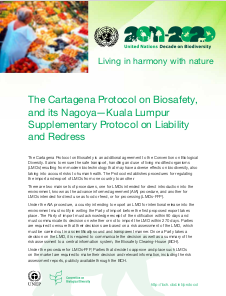Cartagena Protocol on Biosafety to the Convention on Biological Diversity

Source: https://bch.cbd.int/protocol
Law 740 of 2002 in Colombia approves the ratification of the Cartagena Protocol on Biosafety to the Convention on Biological Diversity (hereinafter Cartagena Protocol). The Constitutional Court of Colombia declared the constitutionality of the Protocol in Ruling C-071 of 2003.
This protocol, based on the Precautionary Principle, seeks to ensure the safe transfer, handling and use of living modified organisms (LMOs) resulting from modern biotechnology, in order to protect biological diversity and human health, and focusing specifically on transboundary movements.
Antecedentes:
The Cartagena Protocol is an international treaty adopted on January 29, 2000 in Montreal, which entered into force on September 11, 2003 and to date it has 173 Parties. It bears the name of the Colombian city even though it was not adopted in Cartagena, in acknowledgement of the countries' recognition of the leadership of Colombia during the negotiation process.
The main obligation for Parties is the advance informed agreement established in Articles 7, 10 and 11, which consists of a procedure to ensure that countries receive the information necessary to make informed decisions before accepting the importation of such organisms into their territory.
The Protocol also has a Biosafety Clearing-House to facilitate the exchange of information on living modified organisms and to assist countries in implementing the Protocol.

